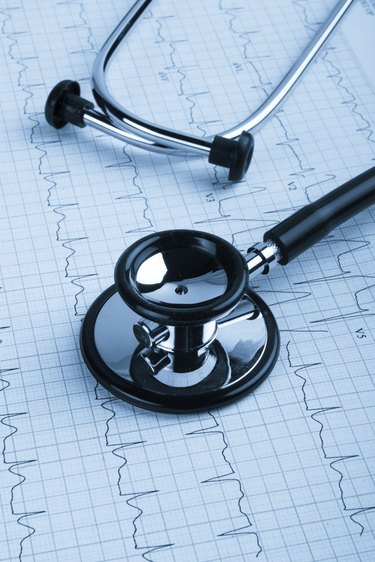
Dehydration occurs when the body does not have enough fluids to carry out its baseline functions. As the body loses fluids, it can affect the concentration of its electrolytes, which are important substances present inside the cells and the bloodstream that affect various metabolic process, including fluid and water balance. One of the electrolytes affected by dehydration is potassium.
The Basics
Video of the Day
Potassium is an electrolyte, an electrically charged molecule vital to the body. According to the National Institutes of Health, or NIH, potassium is involved in the functioning of muscles, the balance of fluids in the bloodstream and the electrical processes that establish a healthy heart rhythm. Potassium is found mostly inside cells, so small changes in the level of potassium outside the cells, in the blood stream, can have significant consequences.
Video of the Day
Causes of High Potassium
According to the Mayo Clinic, the most common reason for hyperkalemia, or elevated potassium levels, is kidney disease. Among these, acute and chronic renal failure, in which the kidneys lose their ability to filter blood and maintain fluids and electrolyte balance, are the most common. Other causes of high potassium include rhabdomyolysis, a condition in which damage to muscle causes the release of potassium from inside the muscle cells; uncontrolled type 1 diabetes; excessive use of potassium supplements; and certain blood pressure medicines.
Symptoms of High Potassium
Hyperkalemia, or high potassium, can cause nausea and vomiting, as well as muscle weakness. The main symptom of hyperkalemia is cardiac toxicity. Because potassium is such an important element in the maintenance of a normal cardiac rhythm, high potassium can cause serious arrhythmias, or abnormal heart rhythms. According to Merck Manuals, this can be as mild as skipped beats or as severe as ventricular fibrillation, a life-threatening quivering of the heart that impairs its ability to deliver blood to organs.
Causes of Dehydration
The main causes of dehydration are excessive fluid loss from the gastrointestinal or urinary tracts. These include stomach viruses, with vomiting and diarrhea; excessive urine output, such as in poorly controlled diabetes or the inappropriate use of diuretics--medicines that lower blood pressure by getting rid of extra fluid; and excessive sweating--for example, with high fevers. Also, dehydration can occur if the person does not get enough fluid because of illness.
Symptoms of Dehydration
The symptoms of dehydration include dry lips and mouth, decreased urine output, decreased or no tears when crying, and nausea with dizziness. In small children, lethargy, sunken eyes and irritability are common. Infants can have a sunken fontanel, or soft spot on the top of the head. Other signs include rapid heart rate, low blood pressure and dry skin.